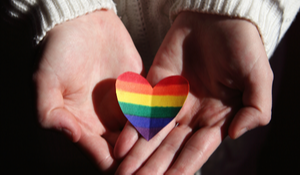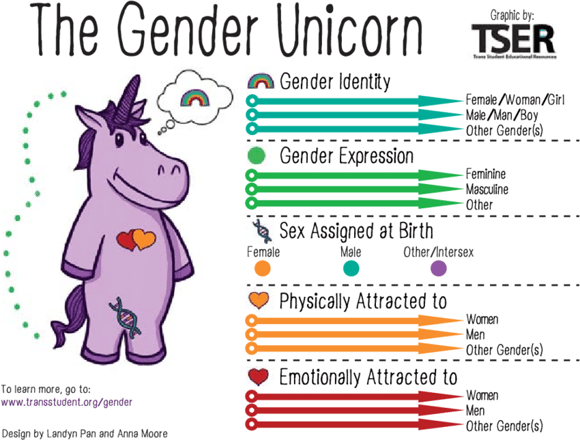Are You Ready to Come Home?
When I am in my office, I am guided by what I needed when I was younger. I needed a therapist that was empathic, funny, nonjudgmental and above all...

Can we talk about gender? I mean, it’s all that’s talked about these days and so it’s not a stretch to ask, but what if we really talked about it? Let’s say your child, your daughter in this example, comes to you and says, “Mom (or Dad or Grandma, you get the picture), I’m not a girl.” How do you react? What does this mean for you? Your family? Is your world turned upside down? It’s a lot to take in. Especially if you haven’t considered what gender means to you. So, let’s do that now.
If we really want to try to understand our kiddos it behooves us to learn the basic definitions of these buzzwords that are being talked about ad nauseum.
So we’ll start off with the basics;
One helpful way to understand the nuances of these terms is to attach a visual representation to them. We do this by consulting the handy-dandy Gender Unicorn (for the purpose of this blog we'll be focusing on the Gender Identity, Gender Expression and Sex Assigned at birth portion of the chart)

Our sex is determined at birth when the doctor looks between our little legs then promptly slaps us on our tiny baby bottoms and hands us over to our loving family. Many families choose to find out the sex of their babies prior to giving birth. This is typically determined through an ultrasound. Ultrasound techs are trained to identify the presence of a penis or vagina while the baby in still in the womb.
On the above chart, sex is visually represented by an image of a chromosome. Females have XX chromosomes, while males have XY chromosomes. Some people are born intersexed. Intersex is defined as a variety of conditions in which a person is born with a reproductive or sexual anatomy that doesn’t seem to fit the typical definitions of female or male . In the context of language, sex may be referred to as “Assigned male at birth” or “Assigned female at birth” AMAB/AFAB, respectively. People who identify as transgender may say something like, "I am a woman, but I was assigned male at birth."
Gender is different from sex. Gender happens in our brain (in the chart this is represented by the image of a rainbow in a thought bubble). Gender is how we conceptualize who we are. For some, the gender they were assigned as a baby aligns with how they see themselves (when you hear the phrase Cisgendered this is what they are referring to). For others, the gender they were assigned doesn’t align with how they see themselves and experience their body (this is what we mean when we refer to transgender).
Gender is nuanced. Sometimes people don’t experience gender at all (that’s called being agender), sometimes they are Gender Non-conforming (simply not conforming to gender roles). Some folks identify as Nonbinary which means they do not identify with being male or female. You can also be Genderfluid (being a person whose gender identity is not fixed, Gender-fluid individuals prefer to remain flexible about their gender).
Gender expression on our chart is visualized by a green dot outlining our Gender Unicorn. Phrases that you may see being used when talking about gender expression include femme (e.g., being effeminate) or masc (e.g., masculine). When we call a little girl a tomboy we are commenting on her gender expression—perhaps her mannerisms are masculine in nature (she’s rough, she loves getting dirty in the mud and prefers pants over skirts). Gender expression is also nuanced in that it has a lot to do with what is deemed acceptable at the time by society at large.
I recognize this is a lot to take in. There are college majors where students study the depth and breadth of these concepts, so don’t feel bad if you’re feeling overwhelmed right now. Consider this your introductory lesson into understanding your child on a deeper level.
Let’s go back to the example from above. You’re darling daughter comes to you and says, “I’m not a girl.” How does one react to such a revelation? Well, there are many ways. What I want to highlight before we get to those ways is the fact that your child felt safe enough to tell you this at all. This means you are their safe person, and they are trusting you with some significant information. If you’d like to keep playing that role in their lives I would recommend this response, “Thank you for sharing this with me. I love you no matter what.”
Since the dawn on man humans have explored what it means to exist in this world. Your child is doing the same. Your child is exploring their gender, and gender identity, and how it relates their sex. They are doing this to better understand themselves and others in their lives.
But how you respond to your child about this subject matter remains timeless—all they are asking of you is to love them. To accept them. To take this journey with them and remain curious about how they see themselves. More often than not they just want someone to listen.
They will always be your baby. They will always need you. That does not change. Rise to the occasion. If this process feels overwhelming to you, or you are struggling with how to support your child I want to extend an invitation to work with me. Parents deserve a space to make sense of how their children are developing and how it affects them as their parents.
**If you are interested in learning more about gender and all the variations on gender I mentioned in this blog, then you should check out this Healthline.com article that features a whopping 68 definitions!

When I am in my office, I am guided by what I needed when I was younger. I needed a therapist that was empathic, funny, nonjudgmental and above all...

When the subject of sex comes up in session it is often in hushed whispers with eyes diverted to the ground. People (adults usually) are admitting...

Picture it—I stand before you, perfect erect posture, an ornate hat placed upon my head and bedecked in some sort of religious garb. I beckon you to...